- Home
- Jean Stone
Sins of Innocence Page 7
Sins of Innocence Read online
Page 7
P.J. cleared her throat. “One more thing, Doctor. Dr. Reynolds said over eighty percent of breast lumps are benign. Is that true?”
He cleared his throat. “As a rule, yes.”
She hesitated. “Can’t you tell … can’t you tell from my mammogram? If it’s … benign?”
“We can never be certain of anything, P.J. Not until the biopsy results have been completed.
P.J. sat alone in the living room of her sprawling condo, wrapped in a huge quilted robe, trying to get warm. Somehow she had taken a cab to the hospital, had the tests, and made it home. It was past six. She had phoned Bob from the hospital and told him she’d have to take a rain check on the weekend. When he said his kids would be disappointed, she’d felt a twinge of guilt, but she knew there was no way she could go. She didn’t want to share this with Bob.
If not Bob, who? Her mother? P.J. winced at the thought. The emotional crack between them had only widened over the years.
She picked at a shard of polish around her manicured fingernail. Was there a friend she could call? No. P.J. had never had any close friends. She’d spent the past twenty-three years throwing herself into her career, determined to be the best at what she did. When she wasn’t working, she was with a man. Any man. As long as he could help her career move forward.
She put her feet up on the marble cocktail table and rested her head against one of the loose pillows of the soft celery-colored sectional, thinking about the men in her life. In the seventies they had all been young and great-looking. Account executives, mostly. Whenever she’d walked into a restaurant or a disco or spent a Sunday afternoon jogging through Central Park, P.J. was with a hunk. They were tight and firm, and they exuded sex. Wherever they went, heads always turned, as though strangers picked up on their sensual scent. And the sex was great. And plentiful.
In the eighties P.J. had mellowed a bit, turning to older, better-established men. Agency owners, CEOs of profitable clients. What they lacked in exuberance, they made up for with attention. White roses, Dom Pérignon, baubles from Cartier, and an occasional promotion along the way.
But love? No, P.J. had loved none. And at those infrequent times when she’d slowed down, and the feeling that something was missing seeped into her, P.J. went back to work with a vengeance. Back to work and, most often, on to a new man. There was always a man waiting; there would always be more men to be found. They loved her, they loved being with her, and being seen with her. They loved her body.
Her tears flowed silently as she touched her right breast. Would any of them love her if her body was deformed? Without her perfect body, what man would want her? Would she—for the rest of her life—sleep alone?
For the past few years P.J. had worked hard to stay in shape. She wasn’t alone. The fitness clubs were jammed with the over-forty crowd, desperately trying to hang on to their rapidly escaping youth. In fact, being over forty was “in,” and P.J. was among those who had capitalized on their experience. She, like others her age, was no longer just sexy; she had become sensual. She was no longer simply beautiful; she had become glamorous. But nothing could stop those little lines from creeping in around her eyes, the same kind of lines she’d always detested on her mother. And nothing could change the reality of that lump that, even as she sat here now, might be spreading its evil throughout her body, carving her fate.
“Didn’t think I’d find you home.”
P.J. jumped. She hadn’t heard the key in the lock. In the dusky light stood Bob.
Her heart beat wildly. “You scared me,” she said.
He walked toward the couch and tossed the keys on it. “That’s what you get for giving me a key.”
P.J. stared down at the key. It was odd, but Bob was the first man she’d ever given one to. She had no idea why she’d done it.
“At least I didn’t catch you with another man.”
“What?” P.J. was confused. What was he doing here?
He flopped on the couch beside her. “Just kidding. So how’d it go.”
“What?”
“The sync. At Sound Tech. You’re home earlier than I thought you’d be.”
P.J. moved a little away from him. “Okay,” she said. “It went okay.”
“It’s not too late to head out to the Island.”
P.J. shook her head. “I don’t think so, Bob. I’ve got a headache.”
“You? A headache?” He laughed. “Tell me something I’ll believe.” He reached over and snapped on the Stiffel lamp. Then he looked at P.J. “Hey,” he whispered. “You’ve been crying.”
She wiped her cheeks. “No, I haven’t.”
He touched her face. “Yes, you have. What’s wrong?”
“Nothing,” she said. “PMS attack, I guess.”
“I’ve never known you to get PMS.”
She shrugged and stood up. “Just goes to show how little you know about me.” She walked to the other side of the room and straightened the Monet print. One of her dreams was to have a Monet original; she had planned to invest in one if—when—she was made a partner in the agency, but now …
“What’s going on, Peej?”
She hated it when Bob called her “Peej.” Her little brother had done that when they were kids.
She shook her head again. “I told you. Nothing.” She pushed up the sleeves of her robe. The right sleeve caught on the cotton ball from the blood test that was still taped to her arm. She quickly bent her arm so Bob wouldn’t see. “You go ahead without me,” she said, and turned back to Bob. “It’s been a long week. I’m tired.”
He stared at her.
“Bob, please.”
“Not until you tell me what’s going on.”
P.J. felt her anger now. “I have a life you know, outside of the office.”
“Yes. And I thought it was with me.”
Her head began to throb. She pressed a finger to her temple. She liked Bob. Probably more than she should. The last thing she wanted to do was alienate him. Especially now, she told herself. Especially with the promotion …
She studied him. He was four years older than she was, and although not as handsome as most of the men she’d dated, he was good-looking in a stable kind of way. She loved the way his shirts were always heavily starched; she loved his soapy-clean, no-nonsense scent. He was gentle with her, but firm in the office. Bob had power quality. The kind that attracted P.J. like cat hair to a black skirt.
“I’ve got a little problem that’s come up. It’s got nothing to do with you. With us.”
“Come here,” he said.
P.J. hesitated. She didn’t want to tell him about this, but she had to tell him she wouldn’t be in the office Monday. It was either that or call in sick. Call in sick! On the day she’d get the biggest promotion of her life? The irony of it made her weak. She walked back to the sofa and sat down.
“What’s going on?” he asked. His voice was understanding, not accusing.
“I …” she hesitated again. How much should she tell him? “I won’t be in the office Monday,” she said.
Bob laughed. “Don’t tell me. Hansen and Hobart called and canned you.”
“That’s not funny.”
“And neither is this. What happened between lunch today and now? And why the hell won’t you be in the office on Monday?”
P.J. tucked her feet underneath her and pulled her hair back on both sides. She wondered if Bob knew she’d been coloring her hair for the past few years, faking what had once been flawless auburn until the gray had begun.
“I have an appointment I can’t cancel. And right now, that’s all I’d like to tell you.”
Bob folded his hands and stared at the carpet. “What kind of appointment?”
P.J. put a hand on Bob’s leg. “Please, Bob. Trust me. I’d rather not go into it now.”
He looked at her. “Is everything okay?”
She nodded, afraid to speak, afraid the tears would come.
“P.J., I’m more than just someone you date. I’m m
ore than a little involved with you. I care, you know.”
She nodded again.
“I’d like to know what’s going on.” He laughed. “Hell, that’s not right, I think I deserve to know. If you don’t tell me, my imagination will take over, and I’ll think all kinds of things. Bad things.”
Suddenly a buzzer rang.
“The doorman,” P.J. said, relief washing over her.
“Expecting someone?” Bob asked. This time his voice was accusing.
“No,” she said firmly, then stood up and went to the intercom.
“At least you didn’t say, ‘Saved by the bell,’ ” Bob tried to joke.
P.J. pushed the button on the wall. “Yes, Walter?”
“Ms. Davies, a lady to see you.”
“Who is it?”
“Name’s Mrs. Randall. Jessica Randall.”
P.J. scowled. She knew no one by that name.
She heard murmuring on the other end of the intercom, then Walter returned.
“Says you know her as Jessica Bates. From a place called Larchwood Hall.”
P.J. froze. Her legs went numb as her mind flew backward in time. Jess Bates. Larchwood Hall. P.J. at twenty years old.
Her mother.
Her father. Her father’s tenderness, his long-ago smile.
The baby. Oh, God, the baby.
She leaned against the wall, trying to catch her breath, her finger still pressed on the button. Bob was beside her, his arm across her back.
“You okay?” he asked.
She turned to him. “What?”
“You screamed,” he said. “P.J., for godsake, what’s going on?”
She shook her head and turned back to the speaker. “This is not a convenient time,” she said hoarsely. The speaker crackled.
“P.J.?” The voice was a woman’s. “This will only take a minute. Please.”
P.J. looked at Bob. Her thoughts raced. She touched the top of her breast. Why now? Why was this all happening? It was some kind of nightmare. It must be some kind of nightmare.
Bob leaned over her and pressed the button. “Not now,” he said.
P.J. felt faint. Jess Bates was here? After all these years? Maybe she was sick. No, no! she told herself, I’m the one who’s sick! But maybe Jess needed her. P.J. felt a rush of love. They had shared the worst time … they had shared everything. If, P.J. thought, if I still believed in God, I might be convinced that he had sent Jess now, to help me, to give me back a friend.…
P.J. turned sharply and pressed the button. “Walter?” she asked.
“Yes, ma’am?”
“Is the woman still there?”
“She’s gone, ma’am.”
“Go get her!” she demanded. “And send her up.” She brushed past Bob and went back to the living room. “I think I’d like you to leave,” she said.
“What?”
“Please, Bob. I’m okay, honestly.” She tried to sound composed. “Jess is an old friend. I’d like to see her alone.”
Bob ran his fingers through his thinning hair. “Jesus Christ,” he said. “I don’t believe this. What the hell is going on?”
“Nothing, Bob. Please believe me. I was just in a bad mood. Seeing Jess will help, I’m sure. Now, please, go.”
“Will you call me later?” He sounded like a rejected schoolboy.
“Yes. Yes, of course.”
He walked toward her. She let him kiss her, then she quickly broke away.
“Please,” she said. “I’d like to put on some clothes and fix my hair before she gets upstairs.” The numbness in her knees was gone, replaced by what was an almost exhilarating feeling. Jess. She was going to see Jess. It had been so long.… But why was she here?
“Go. Do it,” Bob said. “I’ll wait.”
P.J. threw up her hands and stalked off toward the bedroom. Bob followed her.
“Who is she, anyway?” he demanded.
“I told you,” P.J. said, as she opened her mirrored closet door and quickly scanned the contents. “An old friend.” She slid out of her robe and into an ivory jumpsuit, then swept past Bob toward the bathroom. Grabbing a brush from the wall-length vanity, she passed the brush through her hair, then bent close to the mirror to inspect her makeup.
Bob’s reflection appeared behind her. He was holding something. Something small.
“What the hell is this?” he asked.
P.J. turned. “What?” She looked into his hand. There was the cotton ball, dotted with blood. She sucked in her breath. It must have fallen off when she’d taken off her robe. She looked back at the mirror. He doesn’t own me, she reminded herself as she fluffed her hair again.
“It looks like the kind of thing you get after a blood test,” he said.
“Then I guess that’s what it is.”
She picked up a sable brush and began adding pink to her cheeks.
“I thought you had your checkup the other day.”
P.J. shrugged. “Must be from that. It must have fallen off in my closet.” Her words sounded strong, but her heart was pounding. She didn’t want to tell Bob. Not yet. Maybe not ever. Anyway, it was none of his business. She glanced at him in the mirror. He was studying the cotton ball.
“This is so exciting,” P.J. rambled. “I haven’t seen Jess in years.”
He wadded the cotton and tossed it into the wastebasket. Case closed, P.J. hoped.
“Is she an old friend from college?”
“No. Well, sort of. From college days.”
“Tell me about her.”
P.J. pulled off the top of a tube, and turned up the mandarin-colored lipstick. She carefully outlined her lips, filled them in, then smiled into the mirror. She realized that she hadn’t smiled since noontime. She turned to Bob and ruffled his hair.
“Out!” she shouted. “Out of my house! I’ll call you later.” She pushed him through the doorway, back into the living room. The doorbell rang.
“Looks like I’ll at least get a look at the woman who put you back in a good mood.”
P.J. put a hand on his cheek and kissed him. “I’m okay, really I am.” At that moment P.J. almost believed herself. “Don’t worry about me. I’ll call you later.”
Bob followed her to the front door. P.J. took a deep breath and opened it.
On the other side stood barely a whisper of a woman. Tiny and fragile, just as she’d always been. Hair still light, cheekbones still protruding.
“P.J.,” the woman said. “My gosh, I’d know you anywhere.”
“Jess,” P.J. responded, suddenly feeling unsure of this. She stiffened a moment, then relaxed. She held open her arms. “It’s wonderful to see you.” The women hugged. P.J. heard Bob clear his throat.
“Excuse me, ladies,” he said. “I was just leaving.”
“Oh,” Jess said. “I’m sorry. I hate to drop in.…”
“It’s all right. That’s Bob.”
“Nice to meet you.” He feigned a tipped hat toward P.J. “Call me later,” he said.
He closed the door behind him. P.J. stood and stared at Jess.
“Husband?” Jess asked.
“What? Oh, no. I’m not married. Bob’s just a friend.”
“Good friend?” Jess joked.
“Good friend,” P.J. laughed. “Now come in, come in.” With her arm still around Jess, P.J. guided her into the living room. “Can I get you a drink? Or coffee? Tea?”
Jess sat on the sofa. The same place where, only a little while before, P.J. had sat so alone, so afraid.
“Actually a drink would be great. Do you have any wine?”
P.J. went toward the bar, with the afternoon, and Monday, pushed as far from her mind as she could manage. “You look wonderful, Jess,” she said, as she opened the small refrigerator and took out a bottle. “What about you? Are you married?”
“Oh, yes. Twenty years. Three kids.”
“Wow.” She poured the wine into Baccarat stemware.
“What about you? Are you divorced or something?”
P.J. carried the glasses to the sofa. She handed one to Jess, then sat down beside her. “No,” she said. “I never married.”
Jess took a sip. “I can’t believe it! You never married? You, who out of all of us, could have had any man you wanted?”
P.J. swallowed her wine. She looked at Jess, once a child, now a confident woman, a wife, a mother. P.J. no longer felt like a successful art-director-turned-ad-agency-executive. She felt twenty years old again, unsure of the future, unsure of herself. She was suddenly impatient to know why this woman was here. “Thanks for the compliment. But no, I guess I never found Mr. Right.” She set her glass on the table. “Tell me, Jess, how did you find me? And what brings you here?”
“Your mother told me where you were. I got a hold of her through Miss Taylor.”
“Miss Taylor?” P.J.’s mind drifted back in time. She pictured the housemother, her bright red lips, her lavender scent, her tobacco-stained fingers. Then P.J. felt the ache again. It welled up inside her like a lion in a cage. Miss Taylor. Larchwood Hall. Without thinking, P.J. touched her stomach.
“You never had any more children?” Jess was asking.
“No. No more.”
“That’s too bad.”
P.J. stood up and crossed the room to the Monet print. Damn, why couldn’t that hang straight?
“Your mother said you’re an artist.”
P.J. shrugged. “Commercial. Designer, actually.” She wanted to say she was about to become a partner in the agency, but something stopped her. Her life was beginning to feel so small, so inconsequential.
“So you went back to college after …” Jess was the one who hesitated now. “After Larchwood?”
P.J. nodded and returned to the sofa. “Chicago Art Institute.”
“That’s nice,” Jess said, and looked around the room. “You’ve done very well.”
P.J. took another sip of wine. “Why, Jess?” she asked. “Why are you here?”
Jess closed her eyes. For the first time P.J. noticed Jess was still impeccably dressed, and that she still wore the massive emerald-and-diamond ring. Except for the translucent film of maturity, Jess could have been that fifteen-year-old girl of 1968. Innocent, lost, and oh, so sad. Odd, P.J. thought, how memories of people are locked within the framework of the time in which we knew them.

 A Vineyard Morning
A Vineyard Morning A Vineyard Summer
A Vineyard Summer A Vineyard Crossing
A Vineyard Crossing A Vineyard Christmas
A Vineyard Christmas Beach Roses
Beach Roses Off Season
Off Season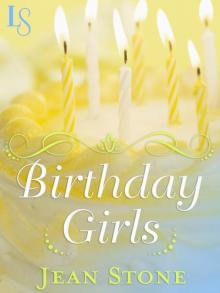 Birthday Girls
Birthday Girls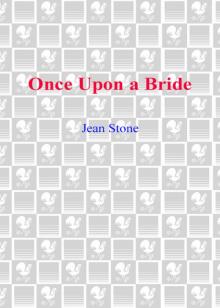 Once Upon a Bride
Once Upon a Bride Places by the Sea
Places by the Sea Trust Fund Babies
Trust Fund Babies The Summer House
The Summer House Tides of the Heart
Tides of the Heart Sins of Innocence
Sins of Innocence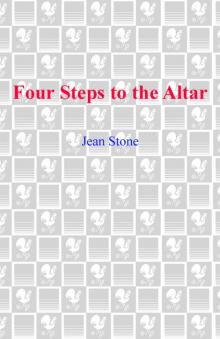 Four Steps to the Altar
Four Steps to the Altar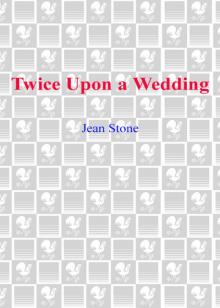 Twice Upon a Wedding
Twice Upon a Wedding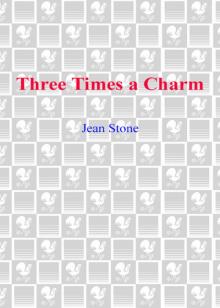 Three Times a Charm
Three Times a Charm